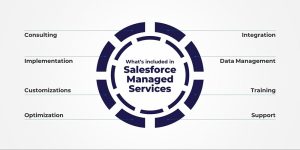Effective managed services are guided by several key principles that help ensure IT services' successful…
You did the work to find a system, lived through the implementation and now you’ve got to figure out how to maintain it. As someone once told me – it’s all well and good to find the money to buy a Giraffe – but now you have to feed it. Let’s consider the pros and cons of Managed Services, In-House Talent and a Hybrid approach to maintaining technical operations.
Managed Services
- Cost Savings
- Pro: Managed services often offer cost savings as they operate on a subscription or pay-as-you-go model, reducing upfront capital expenses.
- Con: The cost can accumulate over time, and unexpected charges may arise.
- Access to Specialized Skills:
- Pro: Provides access to a diverse range of specialized skills and expertise.
- Con: Dependency on external expertise, which may not fully understand the intricacies of your business.
- Scalability:
- Pro: Easily scalable, allowing you to adjust resources based on business needs.

- Con: Potential challenges in aligning with the specific nuances of your organization’s processes and requirements.
- Pro: Easily scalable, allowing you to adjust resources based on business needs.
- Focus on Core Business:
- Pro: Allows your internal team to focus on core business functions while outsourcing non-core activities.
- Con: Dependency on external entities for critical business functions.
- 24/7 Support:
- Pro: Many managed service providers offer continuous support and monitoring.
- Con: Lack of immediate on-site support, which may be crucial for some organizations.
In-House Talent
- Cultural Alignment:
- Pro: In-house teams typically have a better understanding of the company culture, goals, and internal processes.
- Con: May lead to insular thinking and limited exposure to external best practices.
- Immediate Access:
- Pro: Enables face-to-face collaboration, quick response to urgent needs, and better communication.
- Con: Higher operational costs, including salaries, benefits, and infrastructure.
- Control and Customization:
- Pro: Direct control over hiring, training, and management, allowing for customization.
- Con: Limited access to specialized skills and potential challenges in recruiting and retaining top talent.
- Security:
- Pro: Enhanced control over data security and compliance.
- Con: The need for significant investment in cybersecurity measures and expertise.
- Integrated Team Dynamics:
- Pro: In-house teams can develop strong team dynamics and a shared sense of mission.
- Con: Limited exposure to external perspectives and potential for groupthink.
Hybrid Approach
- Flexibility:
- Pro: Provides the flexibility to leverage both in-house and external expertise based on specific needs.
- Con: Requires effective management to ensure seamless collaboration between internal and external teams.
- Cost Optimization:
- Pro: Optimizes costs by strategically outsourcing non-core functions while maintaining control over critical processes.
- Con: Complexity in managing a dual structure, and potential for communication gaps.
- Scalability and Specialization:
- Pro: Combines the scalability of managed services with the internal expertise of in-house teams.
- Con: Requires careful coordination to align external and internal efforts effectively.
- Risk Mitigation:
- Pro: Reduces the risk of being entirely dependent on one model, offering a backup if one side faces challenges.
- Con: Requires a sophisticated governance structure to manage the hybrid model effectively.
- Access to Innovation:
- Pro: Can bring in external innovation and best practices while maintaining the stability of internal processes.
- Con: Potential resistance to change within the organization.
Choosing between these models depends on the unique requirements, budget, and strategic goals of your organization. Many businesses find that a hybrid approach allows them to balance flexibility, control, and cost-effectiveness effectively. Regular assessments and adjustments are often necessary to optimize the chosen model over time.
Orchid Connect is a woman-owned Salesforce implementation firm with 30 years of experience serving associations, non-profits and small/medium businesses. We specialize in strategic and implementation services, go-to-market support, and ongoing support. To learn more, reach us at reachout@orchidconnect.com.


